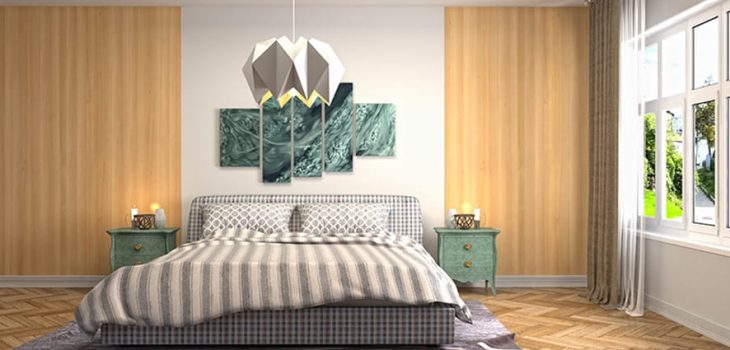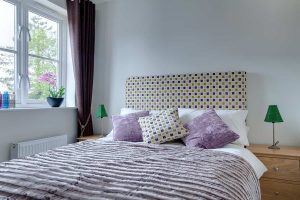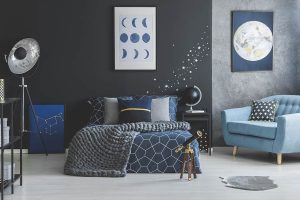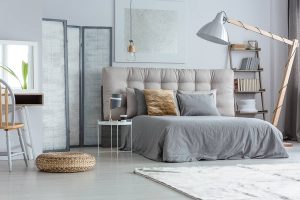Feng Shui is the ancient Chinese wisdom of designing and decorating the living space to ensure the optimal energy balance – the proper flow of Qi.
In Chinese philosophy, disturbances of Qi can lead to many alignments – from bad moods to the inability to find the right partner, to illness. Feng Shui is one of the ways to restore energy balance. That’s why it is said that Feng Shui is a sister science to acupuncture.
“Feng” means “Wind” in Chinese, while “Shui” is a Chinese word for water. Together they symbolize the flow of life that one should aspire to have in his home.
The contemporary form of Feng Shui (often called Western Feng Shui) occurred in the West in the 1970s. It incorporated psychology into the traditional feng shui, using a targeted focus on aspects of life to achieve change or specific goals, while still considering Qi flow and yin and yang balance.
If you feel like something’s off with your living space, or that you are not living your home life to the fullest potential, exploring the art of Feng shui might help.
Feng Shui and Bedrooms
According to feng shui experts, the bedroom is the most important room in your house, It’s quite logical when you think about it – the bedroom is the place you get your precious rest and gather strength to carry on with your daily tasks.
Besides the fact you spend a lot of hours in the room, what also matters from the feng shui perspective is that during all that time you are in a passive state (sleeping). That makes you especially susceptible to the influence of different energies, good and bad.
Those are the reasons why the master bedroom is the first room you should attend to when diving into Feng Shui.
Here is some practical advice – the main points to consider when creating a Feng Shui bedroom. Let’s get started!
Feng Shui Bedroom Layout
The bed is the main piece of furniture and a physical centerpiece of your bedroom. You will consider the bed first and arrange all other pieces of furniture based on where you put your bed.
The bed should be positioned with the headboard against a solid wall. If you don’t have a headboard, place the bed head against the walls, with no windows, and preferably without plumbing running through it. If there is no other option but to use a wall with windows, make sure there is no drought and that you can cover it with a non-transparent curtain while you sleep. This will simulate a solid wall.
The position of the bed should be central – make sure there is enough space on the left and on the right side of the bed. This space is perfect for setting up two nightstands.
Put the nightstand in pairs even if you are single as part of an effort to get your home energy to help attract and accommodate a suitable mate. It is also important to have enough free space on the third side of your bed, where your feet are.
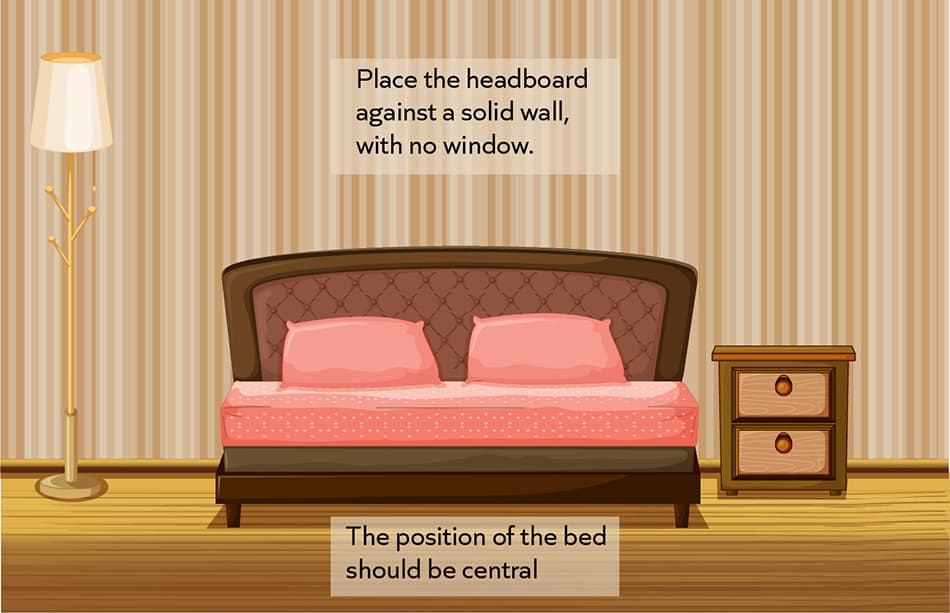
You should also have enough space above your bed. Try not to place it under sloped ceilings or low beams. Massive beams on the ceilings create disturbances in the airflow, especially directly below them. If you have no other option but to have your bed under the beams, you can cover the ceiling with a nice piece of fabric.
A similar rule can be applied to skylight windows or ceiling fans.
Your bed’s position should also be considered with doors in mind. You should be facing the door when lying down in your bed, but not be directly in line with the door. No doors should open up in line with the bed. The “coffin position” where your feet are pointing out of the door is the one that should be avoided the most because it creates an energy flow that is too intense for relaxation.
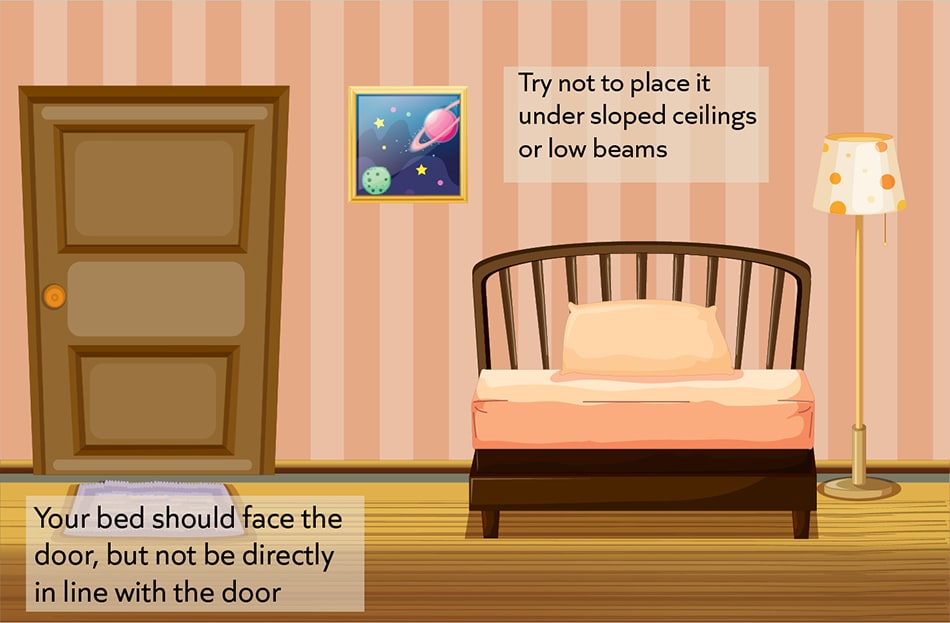
Last but not least, it is ideal to consider your home’s energy grid when choosing a spot for your bed. According to the theory, sleeping at an intersection of the two magnetic field lines can cause many issues – even sickness.
The wrong positioning can also lead to a state of a predicament called a “lonely pillow” – an energetic imbalance that can keep you single or separated from your partner.
You can create the layout of your home’s grid yourself according to instructions you can find in Feng Shui books or online, or hire a professional who will take all things into consideration to pick a perfect spot for your bed.
The Feng Shui Bed
According to feng shui, wooden beds with solid wooden frames and solid headboards are the best. The wood is a non-conductive material, which will prevent electromagnetic outputs from electronic devices to meddle with your sleep. On the other hand, metal frames can act as conductors and even amplifiers of electromagnetic radiation.
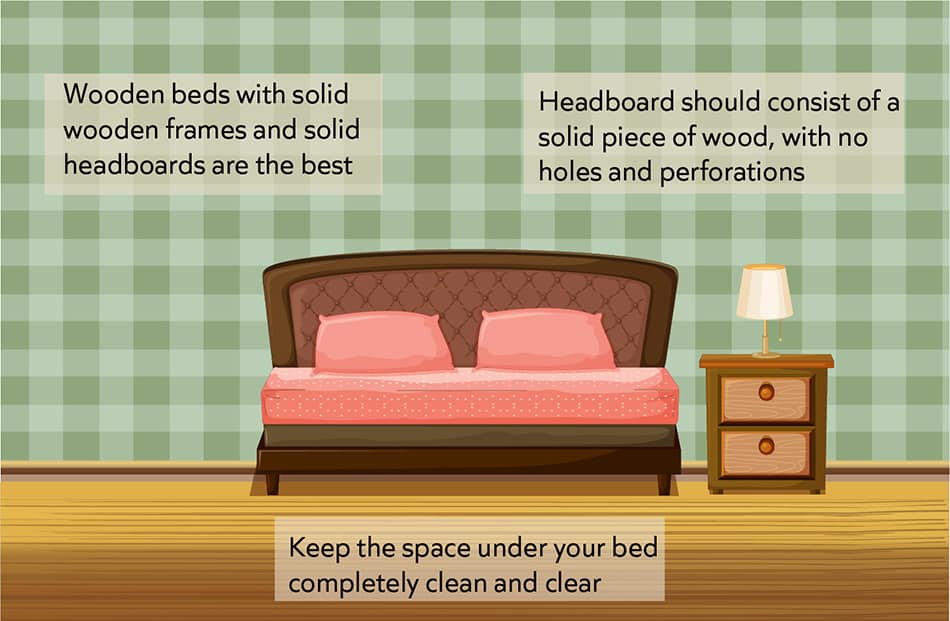
The headboard itself is also important because it acts as a sort of an energetic shield, providing calmness and stability while you sleep. Preferably, it should consist of a solid piece of wood, with no holes and perforations. An upholstered headboard is also an acceptable option.
What you store under your bed is also of big importance. Storing items related to outside movements, such as shoes, will fill your sleep time with restlessness. Any clutter is also detrimental to quality sleep.
The things you can keep under your bed are soft items – especially if they are related to sleep. Bedsheets, pillows, bed covers, and other linen are tolerable items.
The best option, however, is to keep the space under your bed completely clean and clear. Besides Qi balance, clearing excess stuff is good from the practical point of view – clearing clutter from underneath the bed prevents the accumulation of dust and mites, enhancing the air quality of the entire room.
Feng Shui Bedroom Colors
All colors have a distinct effect on the human psyche. The basic idea that we come across in Feng Shui, but also in other interior design color theories, is to pinpoint what you lack in your life from a mental and emotional perspective and supplement your space with a complementary color. Think of it as adding a vitamin you are lacking in your diet.
For example, if you miss romantic energy in your life, using a few splashes of red in the form of objects or other decorations will help.
Here is a color-meaning graph. Based on this, you can supplement the colors that you lack.
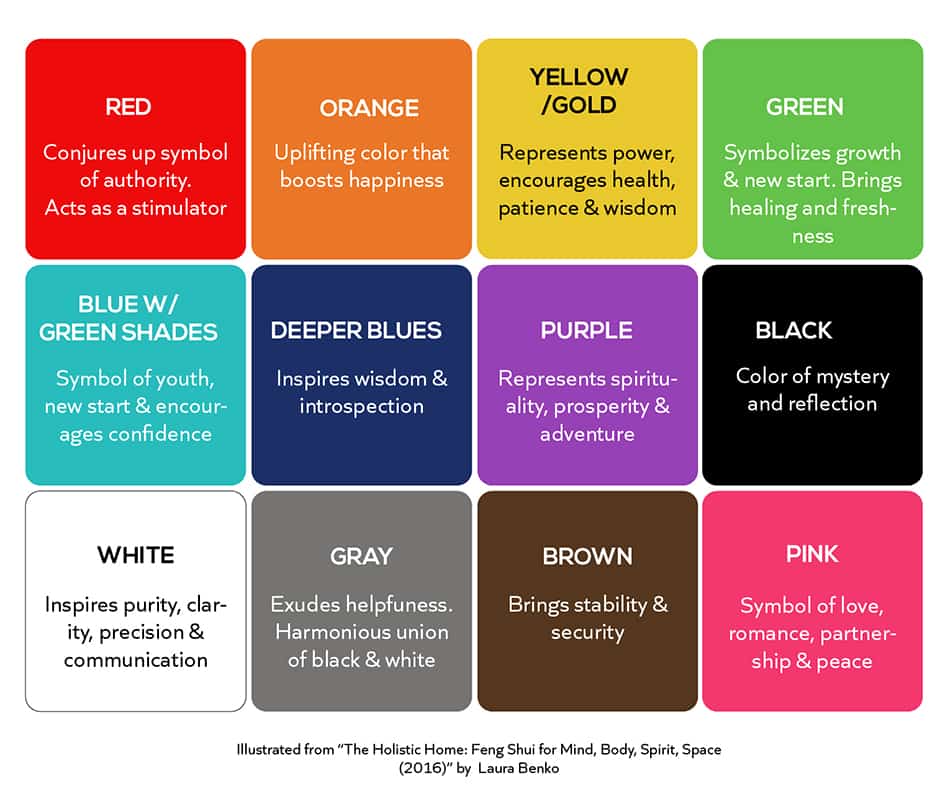
Although painting an entire room in interesting bold colors according to your feelings has become a trend in interior design, Feng Shui has a slightly different approach.
You should choose the interior colors specifically for their relation to the energy map of the home – the Bagua. According to the theory, a home has distinct zones with different energetic needs. Fulfilling them restores harmony.
Still, if you lack the time or resources for detailed planning, neutral and earthy colors – beige, ivory, cream, peach, or light browns – are a safe bet for any bedroom. Wooden tones have a particularly soothing effect.
Colors that bring tranquility – pale green, light sky blue, or light dull pink – can also be a good option if you are really not a fan of neutrals.
If you have specific energetic requirements (remember my aforementioned example with the color red), you can add other, more vivid colors in the forms of details and decor.
Feng Shui Bedroom Decoration
Avoid any pretentious decor in your bedroom, such as a valuable piece of art you don’t really like. Choose the items you really care about. Avoid using overly bold colors and patterns, as the bedroom is supposed to be a serene place.
If you want to have photos in your room, strive to have pictures featuring couples. It doesn’t necessarily have to be your wedding photo. The trick is simply in pairs. Any pair of people dear to you will bring the feeling of harmony and relaxation.
Another important rule of Feng Shui is utilizing the five basic elements for your benefit.
Here are the five elements of Feng Shui (that are also present in other branches of Chinese philosophy). Next to the element, in the brackets, you can see the materials, objects, and concepts that represent them in real life.
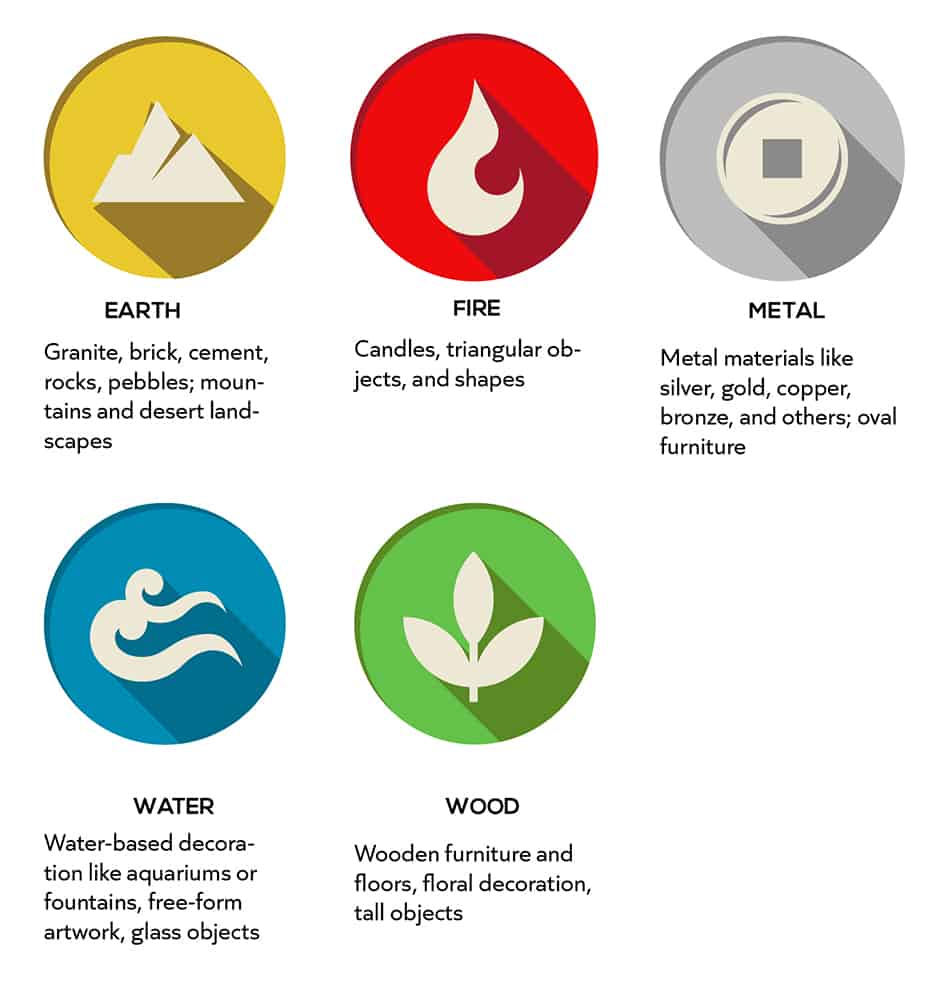
- Earth (granite, brick, cement, rocks, pebbles; mountains and desert landscapes)
- Fire (candles, triangular objects, and shapes)
- Metal (metal materials like silver, gold, copper, bronze, and others; oval furniture),
- Water (water-based decoration like aquariums or fountains, free-form artwork, glass objects),
- Wood (wooden furniture and floors, floral decoration, tall objects).
In order to achieve balance, you need all the five elements in your home – incorporated optimally into the so-called life aspiration areas. The elements also interact with each other, as you can see in any Feng Shui element table. It is a vast subject that is worth exploring further if you really want to have a deeper understanding of Feng Shui beyond the basic advice.
Other Feng Shui Bedroom Rules
No Mirrors

The bedroom is a secluded, private space, and often the place where we keep our wardrobe. That is why bedrooms commonly feature mirrors.
However, according to Feng Shui principles, there should be no mirrors in the bedroom. Mirrors reflect light which leads to the scattering and constant flow of energy. The worst option is to have a mirror in line with your bed so you can see yourself when lying down. The subconscious awareness of your own reflection can lead to restless sleep.
If you have to have a mirror in the bedroom, you can cover it with a piece of fabric when it’s time for rest.
No Electronics
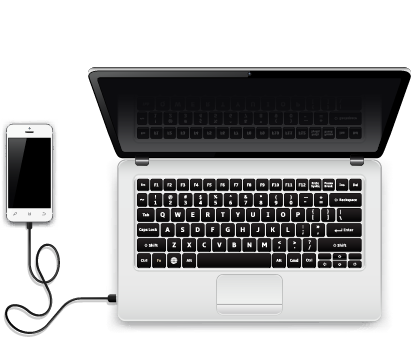
The presence of electronic devices and screens in the bedroom should be strictly limited. Electromagnetic fields that devices inevitably create can result in poor sleep quality and even health issues. Since you are in a passive, motionless state when dreaming in bed, that makes you additionally susceptible to the adverse effects of EMFs.
No Sharp Edges
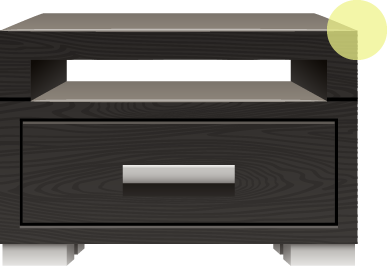
Sharp edges are uninviting and bring out the feeling of discomfort. It will create turbulent chi which affects the home’s energy.
Avoid having pointy furniture or objects in your bedroom. If you have any, there are many solutions to it – placing a plant in front of it (not really applicable for the bedroom), putting a wooden corner cover, wall decals (you can buy them online), or a thick cloth to cover it.
Material Quality
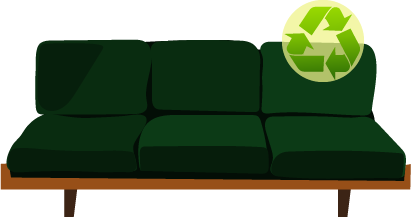
Besides paying attention to the elements of objects in your bedroom, it is also worthy to ensure that the materials you are using are eco-friendly and pesticide-free.
Organic cotton bed sheets and untreated, sustainably harvested wood will ensure there are no harmful volatile compounds leaching into your bedroom air.
Lights

Many people intuitively choose softer and not overly bright lights for their bedrooms, and that is the correct thing to do in the Feng Shui rulebook as well.
The best options for the bedroom are soft and dim lights, which can include candles. If you like to use candlelight, be aware that the candles deplete oxygen and can be a fire hazard, so use them thoughtfully.
Books

Keep only the books you are currently reading in your bedroom. If your bedroom features a bookshelf, consider moving it elsewhere.
If you can’t move the bookcase, organize your books by their color and thickness – heavier books should go to the bottom of the shelf. Also, books should be aligned with the edge of the shelf and not pushed towards the back or protruding forward.
Keep it Tidy, Simple, and Decluttered
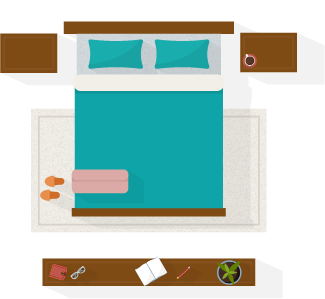
It is highly important to keep your bedroom as decluttered and as neat as possible. Sometimes it’s just too easy to let stuff – especially laundry – pile up in your bedroom. Try to break that habit since any chaos in the main place of your rest can lead to nighttime restlessness and other unwanted effects.
Make sure to close all the doors and drawers when you finish using them.
Conclusion
Feng Shui has the ability to change the living space in two realms – visible and invisible. By applying Feng Shui principles to your bedroom, it will become neater, more peaceful, and more pleasing to the eye. At the same time, it will have a good flow of vital energy.
The beauty of Feng Shui is also that no matter how deep you want to dive into this ancient art, you will be rewarded. While applying advanced principles will deliver the best effect, even the simplest changes will make your home more comfortable and soulful.
Did you decorate your bedroom in a Feng Shui manner? Do you sleep better? Feel free to share your Feng Shui experience in the comments.
Here is the infographic that illustrates the main points of this article. Share and Pin it now!

